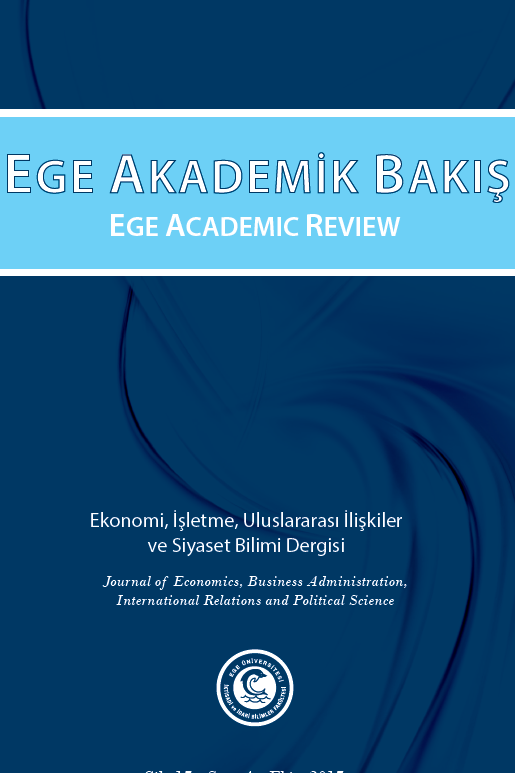OTEL İŞLETMELERİNİN İNTERNET TABANLI MÜŞTERİ İLİŞKİLERİNDE “E-POSTA YÖNETİMİ” VE TÜRKİYE’DEKİ OTEL İŞLETMELERİ ÜZERİNE BİR ARAŞTIRMA
Gelişen bilişim teknolojilerinin bir sonucu olan “e – posta” kullanımı işletme ve müşteri ilişkilerine yeni bir boyut kazandırmıştır. Çalışmada müşteri ilişkileri araçlarından biri olarak kullanılan “e posta” yönetimi kavramı verilmiş ve otel işletmeleri açısından konu irdelenmiştir. Çalışmanın temel amacı Türkiye‟deki otellerin e-posta kullanımının etkinliğini belirlemektir. Çalışmada gizli müşteri yaklaşımı kullanılarak Türkiye‟deki e postaya sahip tüm otellerden konaklama ile ilgili bilgi talebinde bulunulmuş ve taleplere verilen cevaplar içerik, biçim ve hız açısından değerlendirilip, gönderilen otellerin yıldızı, bölgesi ve tipine göre istatistiksel analizlere tabi tutulmuştur
Anahtar Kelimeler:
Otel İşletmeleri, E-posta Yönetimi, Müşteri İlişkileri
E-MAIL MANAGEMENT IN WEB-BASED CUSTOMER RELATIONS AND A STUDY ON HOTEL ESTABLISHMENTS IN TURKEY
E-mail usage as a result of technological development has provided a new dimension between customer relationship and businesses. In this study e-mail management as a customer relationship tool has been reviewed in hotel establishments. The main purpose of this study is to explore the effectiveness of e-mail usage in hotels in Turkey. In order to achieve this purpose, mystery guest approach has been used and an inquiry mail about accommodation is send to hotels in Turkey, The response behavior to e-mail inquiries in the aspect of response quality and response speed are evaluated and the differences are investigated according to hotel scale, geographic location and hotel types
Keywords:
Hotel Establishments, customer relations, e–mail management,
___
- Demir, M. ve Demir Şen, Ş. (2003) Konaklama İşletmelerinde EBS- Elektronik Bilgi Sisteminin İşgörenler Üzerindeki Etkilerinin Araştırılması. Anatolia Turizm Araştırmaları Dergisi 14(1) ss.56-64.
- Fux, M., Notı, M., ve Myrach, T. (2006). Quality of Feedback to e-mail Requests- An Explorative Study in Alpine Tourism Destinations içinde Hitz, M., Sigala, M., Murphy, J. (Eds.): Information and Communication Technology in Tourism 2006, Wien, New York: Springer 2006, s. 370.
- Fux, M., Notı, M., ve Myrach, T. (2007). Electronic Customer Care in Tourist Destinations-Exploring the Effects of Offer Inquiry Systems. içinde Sigala, M., Mich, L. Murphy, J. (Eds.): Information and Communication Technology in Tourism 2007, Wien, New York: Springer 2006, s. 315.
- Gürcü, İ. P. (2007). Satış Temsilcilerinin Performans Değerlendirmesinde Gizli Müşteri Araştırmalarının Kullanımı: XYZ Şirketinde Bir Uygulama, Yıldız Teknik Üniversitesi Sosyal Bilimler Enstitüsü İşletme Anabilim Dalı İnsan Kaynakları Yönetimi Yüksek Lisans Programı Yüksek Lisans Tezi; İstanbul, s:73
- Heung, V.C.S. (2003). Barriers to implementing E-commerce in the travel industry: a practical perspective. International Journal of Management, 22 (1), ss.111–118.
- Hospitality Jeong, M. ve Lambert, C. U. (2001). Adaptation of an information quality framework to measure customers‟ behavioral intentions to use lodging Web sites.International Journal of Hospitality Management, 20 (2), ss. 129–146.
- Karamustafa, K., Biçkes, D.M., Ulama Ş. (2002) Türkiye‟deki konaklama işletmelerinin internet web sitelerini değerlendirmeye yönelik bir çalışma, Erciyes Üniversitesi İktisadi ve İdari Bilimler Fakültesi Dergisi, 19, ss. 51–92.
- Kim, W.G. ve Kim, D.J. (2004). Factors affecting online hotel reservation intention between online and non-online customers. International Journal of Hospitality Management, 23 (4), ss.381–395.
- Law, R. ve Chung, T. (2003). Developing a performance indicator for hotel websites.International Journal of Hospitality Management, 22 (1), ss. 119–125.
- Law, R. ve Hsu, C.H.C. (2006). Importance of Hotel Website Dimensions and Attributes: Perceptions of Online Browsers and Online Purchasers. Journal of Hospitality & Tourism Research, 30(3), ss. 295–312.
- Matzler, K., Pechlaner, H., Abfalter, D. ve Wolf, M. (2005), Determinants of response to customer e-mail enquiries to hotels: evidence from Austria.
- Murphy, J., Olaru, D., Schegg, R., Frey, S. (2003) The Bandwagon Effect: Swiss Hotels Web-site and E-mail Management, Cornell Hotel and Restaurant Administration Quarterly, February, ss.71-87.
- Namasıvayam, K., Enz, C., ve Sıguaw, J. A. (2000). How Wired Are We? Cornell Hotel and Restaurant Administration Quarterly, December, ss.40-48.
- Öksüz, B. ve Bat, M. (2007) Otellerde Müşteri İlişkileri Yönetimi: İzmir‟deki Beş Yıldızlı Otellerin Kurumsal Web Sitelerinde Müşteri İlişkileri Yönetimine Yönelik Karşılaştırmalı Bir Analiz. Çeşme Ulusal Turizm Sempozyumu Bildiriler Kitabı, 21-23 Kasım, Çeşme, ss.59-70.
- Özgen I, Aksaraylı, M., (2006) „Opinions and Perceptions of Travel Professionals and Internet User‟s About Hotel Website Characteristics: A Focus Group Study‟ Turk-Kazakh International Tourism Conference 2006 „New Perspectives and Values in World Tourism & Tourism Management in the Future Bildiriler Kitapçığı:1605-1617, 20-23 Kasım, Akdeniz Üniversitesi, Alanya.
- Scharl, A., Wöber, K.W., Bauer, C. (2004). An Integrated Approach to Measure Web-Site Effectiveness in the European Hotel Industry. Information Technology & Tourism. 6.ss: 257-271.
- Schegg, R., Murphy, J. ve Leuenberger, R. (2003). Five Star Treatment E-mail Customer Service by International Luxury Hotels , Information Technology & Tourism 6, ss. 99-112.
- Sekaran, U.(2000). Research Methods for Business. New York: John Wiley & Sons.
- Soyaslan, M.(2006) Müşteri İlişkileri Yönetimi ve Türkiye‟deki Oteller Üzerine Bir Araştırma, Uludağ Üniversitesi, Sosyal Bilimler Enstitüsü, Yayınlanmamış Yükseklisans Tezi, Bursa.
- http://www.internetworldstats.com/stats.htm (Erişim tarihi: 19.03.2010)
- http://www.internetworldstats.com/stats4.htm#europe (Erişim tarihi: 19.03.2010)
- http://www.tdk.gov.tr (Erişim tarihi: 07.06.2008)
- http://www.tursab.org.tr/content/turkish/istatistikler/gostergeler/TESISYIL.asp (Erişim tarihi: 07.06.2008)
- ISSN: 1303-099X
- Yayın Aralığı: Yılda 4 Sayı
- Başlangıç: 2000
- Yayıncı: Ege Üniversitesi
Sayıdaki Diğer Makaleler
THIRLWALL YASASI: TÜRKİYE ÖRNEĞİ, 1982-2008
TÜRKİYE’DE HANEHALKI YOKSULLUĞU
THE DISTRIBUTION OF THE INFLATION IN TURKEY
HAM PETROL FİYATLARININ YAPAY SİNİR AĞLARI İLE TAHMİNİ
Serkan TAŞTAN, Ferhan DEMİRKOPARAN, Oğuz KAYNAR
TÜRKİYE’DE HANEHALKININ VE FİNANSAL KESİMİN PORTFÖY TERCİHLERİ
